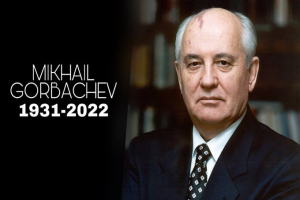
Moscow/Washington/New York/Beijing: With the passing of Mikhail Sergeyevich Gorbachev, the last President of the Union of Soviet Socialist Republics (USSR) before its disintegration in 1991, an era has come to an end. the 91-year-old Gorbachev breathed his last on August 30, 2022, in Russia’s Central Clinical Hospital in Moscow which said he had a “serious and protracted disease”.
Russian President Vladimir Putin, who today sent condolences to Gorbachev’s family on his passing, described the departed leader as a politician and a statesman “who exerted a tremendous influence on the course of world history”.
Perhaps no word is more closely associated with Gorbachev than glasnost or openness. That’s fitting for a man whose openness changed the course of human history. Some of his major achievements included the end of the Cold War without any bloodshed, the fall of the Berlin Wall, and the first-ever agreement to reduce the nuclear arsenals of the U.S. and the USSR. In 1988, India awarded him the Indira Gandhi Prize for Peace, Disarmament and Development. He won the Nobel Prize for Peace for “his leading role in the peace process which today characterizes important parts of the international community” in 1990. The United Nations Secretary-General António Guterres while extending his condolences on behalf of the United Nations to Mikhail Gorbachev’s family and to the people and Government of the Russian Federation, pointed out that while receiving the 1990 Nobel Peace Prize, Gorbachev observed that “peace is not unity in similarity, but unity in diversity”.
Guterres said Gorbachev put this vital insight into practice by pursuing the path of negotiation, reform, transparency and disarmament.
“But those achievements would have been unimaginable without the courage and determination Mr. Gorbachev brought to his pursuit of openness, and the trust he built with Presidents Ronald Reagan and George H.W. Bush,” Antony J Blinken, the Secretary of State of the United States pointed out in a statement today.
Gorbachev, who was born on March 2, 1931, in Privol’noe in Russia, assumed the mantle of the USSR in 1985 as General Secretary of the Communist Party of the Soviet Union, and then as the President of the Soviet Union from 1990 until the country’s dissolution in 1991. He openly acknowledged his country’s history – not just its triumphs, but its tragedies – what he called the “blank spots” of the Soviet Union’s past. He created space for dissenting views and freed dissidents who had spent years in exile or prison. He was also open to working with other nations, including adversaries like the United States, driven by the conviction that dialogue was in the interest of his people – and all people.
Today, American President Joe Biden paid rich tributes to the departed leader and recounted that when Gorbachev came to power the Cold War had gone on for nearly 40 years and communism for even longer, with “devastating” consequences. “Few high-level Soviet officials had the courage to admit that things needed to change. As a member of the Senate Foreign Relations Committee, I saw him do that and more,” Biden recalled. “As the leader of the USSR, he worked with President Reagan to reduce our two countries’ nuclear arsenals, to the relief of people worldwide praying for an end to the nuclear arms race. After decades of brutal political repression, he embraced democratic reforms,” Biden said.
Gorbachev believed in glasnost and perestroika – openness and restructuring. According to Biden, there were not mere slogans, but the path forward for the people of the Soviet Union after so many years of isolation and deprivation. “These were the acts of a rare leader – one with the imagination to see that a different future was possible and the courage to risk his entire career to achieve it. The result was a safer world and greater freedom for millions of people,” Biden said.
Putin noted that Gorbachev headed the country at a time of complicated and dramatic change and large-scale foreign policy, economic and social challenges. He realised that reforms were necessary, and he strove to suggest his own solutions to long-standing problems. “I would like to make special mention of the large-scale humanitarian, charitable and educational activities that Mikhail Gorbachev conducted in the past few years,” Putin said.
Gorbachev was a man of remarkable vision. As Biden pointed out, even years after leaving office, he was still deeply engaged. “When Mr. Gorbachev visited the White House in 2009, he and I spoke for a long time about our countries’ ongoing work to reduce U.S. and Russian nuclear stockpiles. It was easy to see why so many worldwide held him in such high esteem,” Biden said.
Gorbachev never lost faith even as some of his greatest accomplishments were weakened. In 2018, he wrote, “Is it too late to return to dialogue and negotiations? I don’t want to lose hope…We must not resign, we must not surrender.”
Blinken said, “He was right, and his life is a powerful reminder of all that can be achieved when we make those ideals a reality.”
Gorbachev’s passing away also prompted a strong reaction on Chinese social media platforms. Chinese foreign ministry spokesperson Zhao Lijian recounted how Gorbachev made a positive contribution to the normalization of relations between China and the Soviet Union. “We mourn his passing and extend our condolences to his family,” Lijian said.
Top photo of Mikhael Gorbachev courtesy Russia in India|Twitter
– global bihari bureau




